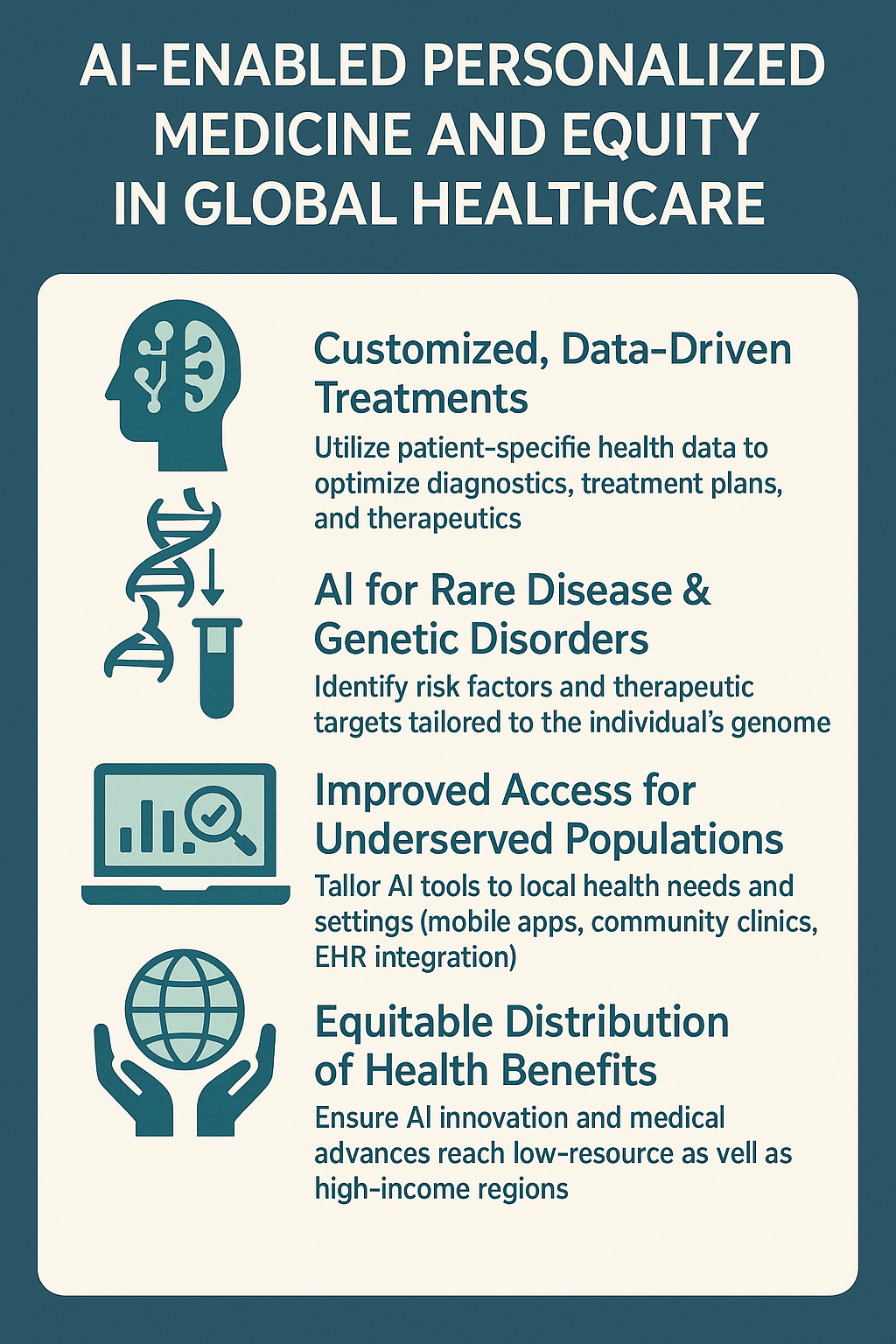Artificial Intelligence (AI) has the potential to revolutionize personalized medicine globally, particularly through genomics-driven treatments. However, achieving true personalization and equitable healthcare delivery demands careful consideration and targeted research to address existing biases and underrepresentation in health datasets.
1. AI’s Role in Personalized Medicine
AI empowers personalized medicine by:
- Genomic Analysis: Rapidly analyzing genetic data to identify individual-specific disease risks and drug responses.
- Precision Diagnostics: Employing machine learning algorithms to predict disease progression and tailor preventive strategies.
- Customized Treatment Plans: Integrating clinical, genomic, and lifestyle data to optimize therapy effectiveness at an individual level.
2. Global Scalability of AI-Personalized Medicine
Scalable personalization is achievable through:
- Cloud-Based AI Platforms: Enabling widespread access to advanced analytical capabilities irrespective of regional resource limitations.
- Mobile Health Technologies: Utilizing smartphones and portable devices for genomic data collection, health monitoring, and personalized advice.
- Global Data Consortiums: Encouraging international collaboration to create comprehensive and diverse genomic datasets.
3. Addressing Equity and Representation
AI-driven personalized medicine must overcome inherent biases arising from dataset underrepresentation:
- Inclusive Data Collection: Expanding genomic databases to include diverse populations historically underrepresented in medical research.
- Bias Detection and Correction: Developing algorithms specifically designed to identify and rectify biases during model training.
- Population-specific Model Validation: Ensuring AI models perform reliably across different ethnicities, genders, and socio-economic groups.
4. Research Priorities for Equitable AI
To ensure equitable AI tools, research must focus on:
- Population Diversity in Genomics: Conducting large-scale, multi-population genomic studies to capture genetic variability across global populations.
- Algorithmic Fairness and Transparency: Investigating methodologies to assess and ensure fairness in AI predictions and recommendations.
- Ethical Frameworks: Formulating guidelines for responsible use of genomic data and protecting privacy, particularly in vulnerable populations.
5. Policy and Infrastructure Development
Effective implementation requires:
- Policy Support: Establishing regulatory frameworks that encourage equitable and responsible AI integration in healthcare.
- Global Infrastructure: Building robust infrastructures, especially in resource-limited settings, to facilitate equitable access to genomic analysis technologies.
- Capacity Building: Offering training programs to healthcare providers globally to effectively interpret and apply AI-generated personalized medical insights.
6. Successful Examples
- Pharmacogenomics Initiatives: AI-driven approaches already inform medication choices based on genetic profiles in oncology and cardiovascular diseases.
- Population-specific Genomic Projects: Initiatives like the All of Us Research Program in the USA aim explicitly to enhance population diversity in health data.
Conclusion
AI’s promise for personalized medicine can only be fully realized through deliberate actions to ensure data diversity, algorithmic fairness, and equitable access. Ongoing research must address biases and build comprehensive global genomic databases to ensure personalized medicine genuinely benefits all populations equitably.

